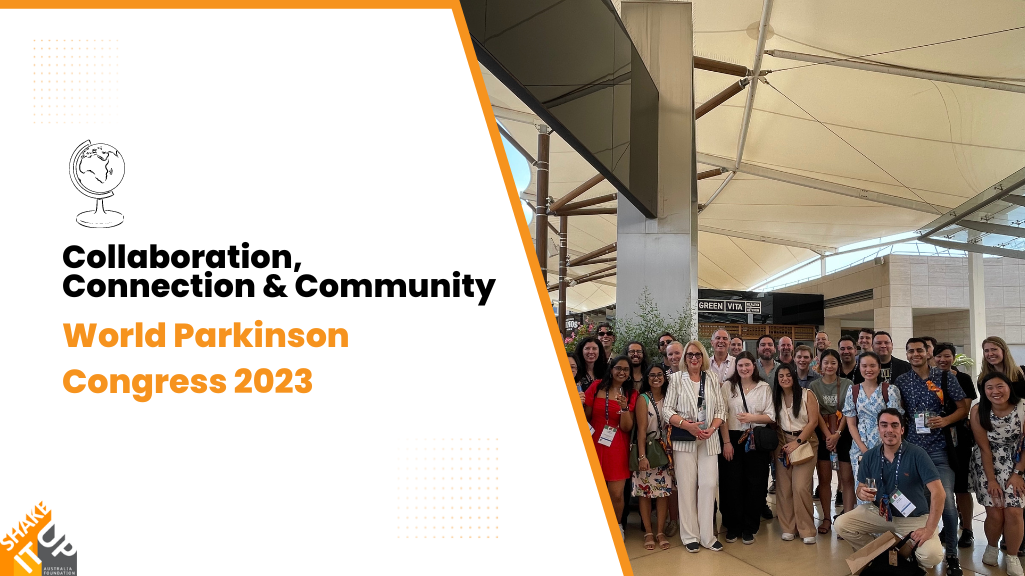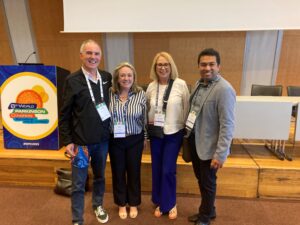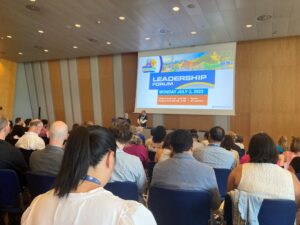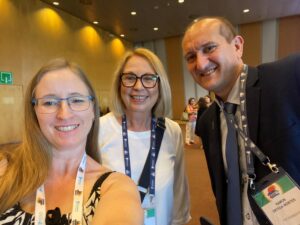
Last month, Shake It Up CEO Vicki Miller and Founder Clyde Campbell had the privilege of travelling to Barcelona to attend the 2023 World Parkinson Congress, an international forum to discuss, learn and engage in debate about the latest scientific discoveries related to Parkinson’s disease.
It was an invaluable opportunity to collaborate and strengthen our relationships with the research community and Parkinson’s organisations across the globe. We came home armed with a deeper understanding of the issues facing our community and an array of new insights that will inform our approach to funding innovative Australian Parkinson’s research moving forward.
Some of the key themes that emerged from the many fascinating presentations and roundtable discussions included:
The role of digital technology in new therapies
From wearable technology and apps, to the role of artificial intelligence (AI) in early detection of Parkinson’s, it’s clear that there is huge potential in the capabilities of digital tech to transform the way we diagnose and treat PD. This new horizon of research brings with it a range of new challenges related to data security. These were discussed at length during the Congress, ensuring patient privacy and safety is always top of mind.
Emerging therapies to slow disease progression and improve quality of life
The progress being made in neuroprotection, gene therapies, surgical therapies such as focused ultrasound and dopamine cell transplants, and new treatments for non-motor symptoms was a key focus area. While the discovery of a cure is the ultimate goal, many researchers are also laser-focused on ensuring people living with Parkinson’s now can receive better treatments to improve their day-to-day life.
The role of gut health and lifestyle for Parkinson’s progression
It’s long been understood that lifestyle elements such as diet and exercise play a key role in managing symptoms of Parkinson’s. However, research presented at the Congress by Per Borghammer highlighted that in fact for some people, their Parkinson’s symptoms actually originate in the body rather than the brain. This not only impacts the rate of progression for different symptoms, but heightens the risk of dementia and/or Lewy bodies for these patients. The finding demonstrates the importance of continued research into the causes of Parkinson’s and its individual nature for each patient.
Eradicating the stigma around Parkinson’s and understanding its impact
At the pre-Congress Leadership Forum, there was an eye-opening and moving session about the way stigma impacts people with Parkinson’s in different countries around the world. The feedback provided by attendees will inform a strategy for destigmatising Parkinson’s globally. The insights shared in this session confirmed the importance of continuing to share stories and experiences with Parkinson’s openly, building and bonding the PD community.
Connecting researchers with people living with PD
We were also thrilled to connect with the early-career researchers funded by Shake It Up Australia with a travel grant to attend and present at the conference. Through this initiative, Australia had the largest number of researchers attending from Australia as travel grant recipients than any other country. Some of the feedback we received from researchers who attended included:
This was one of the most inspirational congresses I have ever been to. It has inspired me to work more closely with people with PD when designing new tests. It has broadened my research networks and confirmed the importance of pursuing research in the prodromal phases of PD.
– Associate Professor Jane Alty, UTAS
When you are a researcher, you are often hyper-focused on the work at hand… In light of my PhD work which showed that AI and chemical instruments can detect early signs of PD from blood samples, I spoke to dozens of people with PD and medical professionals to understand how my research could help them in a practical way. Now that I am equipped with a better understanding of some of the challenges faced by the PD community, I am actively working with multiple organisations to see how our research can drive maximum clinical benefit.
– Diana Zhang, UNSW
I found the experience of chatting to people with Parkinson’s and their carer’s about their day to day activities, what medications are working, what therapy is not working, things they are excited for in the future – really helped me to focus on why I do the research that I do, and ultimately who it really is for.
– Harrison Waters, University of Melbourne





